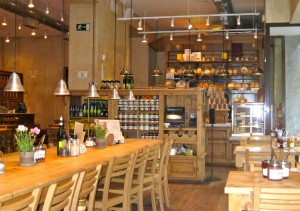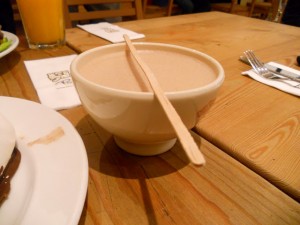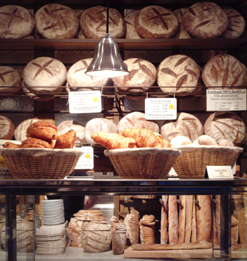Happy to write a short blog post about an “experience brand” from my home country, Belgium.
I discovered Le Pain Quotidien back in 2004 through some friends living in central Brussels, and was immediately captivated by the authenticity, the realness and the homey feel of this place. Little did I know that when I arrived in Dubai in 2007 I’d see it all over the place. And it seems Pain Quotidien are on a roll, expanding all over the world. Hence, I thought it was time to share and to draw lessons from what makes their concept and their experience branding work.
 Le Pain Quotidien is a chain of bakeries, originated in Brussels. Founder Alain Coumont, always in search for “the perfect bread”, opened the first Le Pain Quotidien in Brussels in 1990: a bakery with a central communal table, offering simple but perfect breakfast, brunch and lunch. The setup hasn’t changed since. Not with an inch. Their brand proposition is as wonderful as it is simple: “Le Pain Quotidien transports its customers to the Belgian countryside and a simpler way of life”. (FYI – Le Pain Quotidien is French for “the daily bread”). Coumont is still involved, safeguarding the consistency of the concept.
Le Pain Quotidien is a chain of bakeries, originated in Brussels. Founder Alain Coumont, always in search for “the perfect bread”, opened the first Le Pain Quotidien in Brussels in 1990: a bakery with a central communal table, offering simple but perfect breakfast, brunch and lunch. The setup hasn’t changed since. Not with an inch. Their brand proposition is as wonderful as it is simple: “Le Pain Quotidien transports its customers to the Belgian countryside and a simpler way of life”. (FYI – Le Pain Quotidien is French for “the daily bread”). Coumont is still involved, safeguarding the consistency of the concept.
The concept idea and the execution was so powerful that Le Pain Quotidien grew rapidly, and completely organically: after the first bakery in the Antoine Dansaert Street in Brussels, success came immediately and Alain had numerous candidates who wanted to open other Le Pain Quotidien outlets. In a matter of months, 10 locations opened in Brussels. Alain then followed his dream to open restaurants in the United States. In 1997, Alain opened his first store on Madison Avenue in New York City, which was an instant success. Shortly thereafter, he met a group of Belgian investors who backed his U.S. expansion plans. It opened the door for further global expansion.
Today Le Pain Quotidien has more than 150 stores throughout the world; in Belgium, France, Switzerland, United Kingdom, United States, Kuwait, United Arab Emirates, Turkey, Russia, Qatar, Australia, Spain, Mexico, Bahrain, India and Japan.
Let’s disect the building blocks of their success (according to me):
An ultrasimple idea
Le Pain Quotidien wants to take its consumers back to the countryside, where bread is a central staple, and people sit around one big long table to enjoy their meals. Think about that. Le Pain Quotidien was not set out to give consumers “best tasting bread”. Instead the vision they have now is powerful, allows versatility to cover breakfast, lunch, dinner, onthego and what have you.
Authentic means authentic
Founder Coumon could have been taken on a ride due to the overwhelming interest in his idea. It might have been easy to allow tweaks and deviations to the concept, the retail outlet, the menu etc to cater for local tastes. In the end, from day one and to this date, they offer the Belgian countryside experiences everywhere in the same way: the furniture is the same, the communal table is in every outlet, the menu is the same, most of the product they sell are straight imports from Belgium, etc. Message: don’t deviate for a single bit from the “formula”. Stay true to the heart and soul of the experience. And obviously, current times help: authenticity has become fashionable. It is not old-fashioned. It is “cool” and “hip” to go to Le Pain Quotidien. Smart move to roll that out around the world.
Artisan is something you see, feel, touch, smell
What takes your breath away when you enter any Pain Quotidien is the way they have done the interior design: it’s all rustic, real, natural, with lots of wood, rough edges, imperfections. The smell of bread is everywhere, deliberatly. Very contradictory to a “restaurant” that tries to be clean, neat, and perfect.
It’s more than just the products or the sell, it’s about the experience
The aim of Le Pain Quotidien is to have customers walk away with a good feeling, and to come back for more. They pay more than average attention to how the staff deals with its customers. And let me take a leap in another direction: consumers love social networking … well, isn’t a communal table the ultimate “social network”? I can tell you that I have met people sitting on a long Pain Quotidien table, starting a chat, and then later hooking up for drinks and a night out in Brussels. With that in mind, all I can say is that if the experience you promise is spot-on every single time, the sell and the money will follow. That seems to work out well for Le Pain Quotidien.
Be big, but have them think you’re small.
Today, Le Pain Quotidien is a serious business. With its own CEO, global staff, strategies and all that comes with it. The turnover of Le Pain Quotidien is about $300 million, growing 20% year on year in the last years, despite the recession. The chain makes a 10% profit – much more than most retail operations. BUT … everytime you step into a Pain Quotidien, you think it is run by your grandmother. Delightful!
To close, and the prove of its success, take a look at the following video, about the success of Le Pain Quotidien in RUSSIA:
Thanks for stopping by. Having difficulty reading this post? Then go to https://www.redhotmarketingblender.com/blog/










{ 4 comments… read them below or add one }
This is a very inspirational story…organic for sure. I strive for this same kind of branding for my newly launched business, product launch, and ultimate success. Thank you for sharing!
All the Best,
Pam
Great breakdown on successful branding done by Le Pain Quotidien. Being consistent and staying true to the brand values is key.
Pain Le Quotidien has the best tasting, most holsom, healthy bread I have ever tasted. It took me by suprise when almost everyone else is selling food with unhealty ingredients and here come Le Pain Quotidien with a miracle bread that taste great is healthy and nutrietious.
Why authenticity matters : http://www.brandinsightblog.com/2010/04/28/brand-authenticity-%E2%80%94-keeping-it-real-honest-genuine-and-true/
{ 1 trackback }